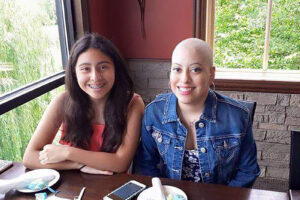
Out With the Old
Melissa Berry of Cancer Fashionista shows us how a simple staple item can refresh your closet post-cancer treatment.

8.
Mouthing Off: New Project Grants from the Canadian Institutes of Health Research (CIHR) are set to help develop research in what role bacteria play in mouth sores caused by chemotherapy by mimicking bacteria combinations found in children’s mouths with cancer. This will help researchers understand how microbes interact with oral cells during chemotherapy to identify bacteria that may offer protection.
9.
To the Screen: The National Cancer Institute is awarding $23 million to four academic institutions to establish centers that will conduct research on the role of telehealth in delivering cancer-related healthcare. The research will study the role of telehealth in fields ranging from prevention to screening; diagnosis to treatment; and survivorship.
7.
Fascin-ating: A study published in eLife has shown that a protein called fascin acts in the control center of cancer cells and influences their ability to repair themselves, grow and move. Conducting more research into how fascin works may help scientists learn how to block its action when it comes to cancer.
8.
Mouthing Off: New Project Grants from the Canadian Institutes of Health Research (CIHR) are set to help develop research in what role bacteria play in mouth sores caused by chemotherapy by mimicking bacteria combinations found in children’s mouths with cancer. This will help researchers understand how microbes interact with oral cells during chemotherapy to identify bacteria that may offer protection.
9.
To the Screen: The National Cancer Institute is awarding $23 million to four academic institutions to establish centers that will conduct research on the role of telehealth in delivering cancer-related healthcare. The research will study the role of telehealth in fields ranging from prevention to screening; diagnosis to treatment; and survivorship.
6.
Go Green: Research at Nippon Medical School shows how nature and rural areas benefit your health more than urban areas. Researchers observed that walking in areas with more greenery reduces stress and blood pressure far more effectively than walks in urban settings. Plants can boost our immune systems and raise our number of natural killer cells, which seek out and destroy tumor cells.
7.
Fascin-ating: A study published in eLife has shown that a protein called fascin acts in the control center of cancer cells and influences their ability to repair themselves, grow and move. Conducting more research into how fascin works may help scientists learn how to block its action when it comes to cancer.
8.
Mouthing Off: New Project Grants from the Canadian Institutes of Health Research (CIHR) are set to help develop research in what role bacteria play in mouth sores caused by chemotherapy by mimicking bacteria combinations found in children’s mouths with cancer. This will help researchers understand how microbes interact with oral cells during chemotherapy to identify bacteria that may offer protection.
9.
To the Screen: The National Cancer Institute is awarding $23 million to four academic institutions to establish centers that will conduct research on the role of telehealth in delivering cancer-related healthcare. The research will study the role of telehealth in fields ranging from prevention to screening; diagnosis to treatment; and survivorship.
5.
Oiled Up: According to an analysis published in PloS One, components of olive oil offer protection against several types of cancer. The study found significant disparities in cancer risks between those who consumed olive oils and those who did not. Olive oil is rich in monounsaturated fatty acids, squalene and phenolic compounds.
6.
Go Green: Research at Nippon Medical School shows how nature and rural areas benefit your health more than urban areas. Researchers observed that walking in areas with more greenery reduces stress and blood pressure far more effectively than walks in urban settings. Plants can boost our immune systems and raise our number of natural killer cells, which seek out and destroy tumor cells.
7.
Fascin-ating: A study published in eLife has shown that a protein called fascin acts in the control center of cancer cells and influences their ability to repair themselves, grow and move. Conducting more research into how fascin works may help scientists learn how to block its action when it comes to cancer.
8.
Mouthing Off: New Project Grants from the Canadian Institutes of Health Research (CIHR) are set to help develop research in what role bacteria play in mouth sores caused by chemotherapy by mimicking bacteria combinations found in children’s mouths with cancer. This will help researchers understand how microbes interact with oral cells during chemotherapy to identify bacteria that may offer protection.
9.
To the Screen: The National Cancer Institute is awarding $23 million to four academic institutions to establish centers that will conduct research on the role of telehealth in delivering cancer-related healthcare. The research will study the role of telehealth in fields ranging from prevention to screening; diagnosis to treatment; and survivorship.
4.
Live(r) and Learn: Investigators at Cedars-Sinai Cancer have created a blood test that uses the same polymerase chain reaction technology, made commonly available during the COVID-19 pandemic, to detect the most common form of liver cancer at an early enough stage that cure is possible.
5.
Oiled Up: According to an analysis published in PloS One, components of olive oil offer protection against several types of cancer. The study found significant disparities in cancer risks between those who consumed olive oils and those who did not. Olive oil is rich in monounsaturated fatty acids, squalene and phenolic compounds.
6.
Go Green: Research at Nippon Medical School shows how nature and rural areas benefit your health more than urban areas. Researchers observed that walking in areas with more greenery reduces stress and blood pressure far more effectively than walks in urban settings. Plants can boost our immune systems and raise our number of natural killer cells, which seek out and destroy tumor cells.
7.
Fascin-ating: A study published in eLife has shown that a protein called fascin acts in the control center of cancer cells and influences their ability to repair themselves, grow and move. Conducting more research into how fascin works may help scientists learn how to block its action when it comes to cancer.
8.
Mouthing Off: New Project Grants from the Canadian Institutes of Health Research (CIHR) are set to help develop research in what role bacteria play in mouth sores caused by chemotherapy by mimicking bacteria combinations found in children’s mouths with cancer. This will help researchers understand how microbes interact with oral cells during chemotherapy to identify bacteria that may offer protection.
9.
To the Screen: The National Cancer Institute is awarding $23 million to four academic institutions to establish centers that will conduct research on the role of telehealth in delivering cancer-related healthcare. The research will study the role of telehealth in fields ranging from prevention to screening; diagnosis to treatment; and survivorship.
3.
Thymus-n’t Stop Now: There may be news on the horizon for thymic cancer. Weill Cornell Medicine is developing a new preclinical model that revealed how a common mutation found in thymic epithelial tumors spark their formation. The model may be able to speed the development of targeted therapies for cancer of the thymus gland.
4.
Live(r) and Learn: Investigators at Cedars-Sinai Cancer have created a blood test that uses the same polymerase chain reaction technology, made commonly available during the COVID-19 pandemic, to detect the most common form of liver cancer at an early enough stage that cure is possible.
5.
Oiled Up: According to an analysis published in PloS One, components of olive oil offer protection against several types of cancer. The study found significant disparities in cancer risks between those who consumed olive oils and those who did not. Olive oil is rich in monounsaturated fatty acids, squalene and phenolic compounds.
6.
Go Green: Research at Nippon Medical School shows how nature and rural areas benefit your health more than urban areas. Researchers observed that walking in areas with more greenery reduces stress and blood pressure far more effectively than walks in urban settings. Plants can boost our immune systems and raise our number of natural killer cells, which seek out and destroy tumor cells.
7.
Fascin-ating: A study published in eLife has shown that a protein called fascin acts in the control center of cancer cells and influences their ability to repair themselves, grow and move. Conducting more research into how fascin works may help scientists learn how to block its action when it comes to cancer.
8.
Mouthing Off: New Project Grants from the Canadian Institutes of Health Research (CIHR) are set to help develop research in what role bacteria play in mouth sores caused by chemotherapy by mimicking bacteria combinations found in children’s mouths with cancer. This will help researchers understand how microbes interact with oral cells during chemotherapy to identify bacteria that may offer protection.
9.
To the Screen: The National Cancer Institute is awarding $23 million to four academic institutions to establish centers that will conduct research on the role of telehealth in delivering cancer-related healthcare. The research will study the role of telehealth in fields ranging from prevention to screening; diagnosis to treatment; and survivorship.
2.
Sugary Sweet: Scientists at Australia’s Griffith University’s Institute for Glycomics are researching the ability to identify unique sugars on ovarian cancer cells that could help prevent the spread of cancer and improve treatment options. These sugars may be potent therapeutic targets in the fight against the spread of ovarian cancer.
3.
Thymus-n’t Stop Now: There may be news on the horizon for thymic cancer. Weill Cornell Medicine is developing a new preclinical model that revealed how a common mutation found in thymic epithelial tumors spark their formation. The model may be able to speed the development of targeted therapies for cancer of the thymus gland.
4.
Live(r) and Learn: Investigators at Cedars-Sinai Cancer have created a blood test that uses the same polymerase chain reaction technology, made commonly available during the COVID-19 pandemic, to detect the most common form of liver cancer at an early enough stage that cure is possible.
5.
Oiled Up: According to an analysis published in PloS One, components of olive oil offer protection against several types of cancer. The study found significant disparities in cancer risks between those who consumed olive oils and those who did not. Olive oil is rich in monounsaturated fatty acids, squalene and phenolic compounds.
6.
Go Green: Research at Nippon Medical School shows how nature and rural areas benefit your health more than urban areas. Researchers observed that walking in areas with more greenery reduces stress and blood pressure far more effectively than walks in urban settings. Plants can boost our immune systems and raise our number of natural killer cells, which seek out and destroy tumor cells.
7.
Fascin-ating: A study published in eLife has shown that a protein called fascin acts in the control center of cancer cells and influences their ability to repair themselves, grow and move. Conducting more research into how fascin works may help scientists learn how to block its action when it comes to cancer.
8.
Mouthing Off: New Project Grants from the Canadian Institutes of Health Research (CIHR) are set to help develop research in what role bacteria play in mouth sores caused by chemotherapy by mimicking bacteria combinations found in children’s mouths with cancer. This will help researchers understand how microbes interact with oral cells during chemotherapy to identify bacteria that may offer protection.
9.
To the Screen: The National Cancer Institute is awarding $23 million to four academic institutions to establish centers that will conduct research on the role of telehealth in delivering cancer-related healthcare. The research will study the role of telehealth in fields ranging from prevention to screening; diagnosis to treatment; and survivorship.
1.
A Plus for PREMMplus: Developed by researchers and physicians at Dana-Farber Cancer Institute, an online tool known as PREMMplus quickly and accurately identifies people who should undergo testing for inherited genetic changes — specifically, ones that increase the risk of developing certain cancers, simply by asking users health-related questions.
2.
Sugary Sweet: Scientists at Australia’s Griffith University’s Institute for Glycomics are researching the ability to identify unique sugars on ovarian cancer cells that could help prevent the spread of cancer and improve treatment options. These sugars may be potent therapeutic targets in the fight against the spread of ovarian cancer.
3.
Thymus-n’t Stop Now: There may be news on the horizon for thymic cancer. Weill Cornell Medicine is developing a new preclinical model that revealed how a common mutation found in thymic epithelial tumors spark their formation. The model may be able to speed the development of targeted therapies for cancer of the thymus gland.
4.
Live(r) and Learn: Investigators at Cedars-Sinai Cancer have created a blood test that uses the same polymerase chain reaction technology, made commonly available during the COVID-19 pandemic, to detect the most common form of liver cancer at an early enough stage that cure is possible.
5.
Oiled Up: According to an analysis published in PloS One, components of olive oil offer protection against several types of cancer. The study found significant disparities in cancer risks between those who consumed olive oils and those who did not. Olive oil is rich in monounsaturated fatty acids, squalene and phenolic compounds.
6.
Go Green: Research at Nippon Medical School shows how nature and rural areas benefit your health more than urban areas. Researchers observed that walking in areas with more greenery reduces stress and blood pressure far more effectively than walks in urban settings. Plants can boost our immune systems and raise our number of natural killer cells, which seek out and destroy tumor cells.
7.
Fascin-ating: A study published in eLife has shown that a protein called fascin acts in the control center of cancer cells and influences their ability to repair themselves, grow and move. Conducting more research into how fascin works may help scientists learn how to block its action when it comes to cancer.
8.
Mouthing Off: New Project Grants from the Canadian Institutes of Health Research (CIHR) are set to help develop research in what role bacteria play in mouth sores caused by chemotherapy by mimicking bacteria combinations found in children’s mouths with cancer. This will help researchers understand how microbes interact with oral cells during chemotherapy to identify bacteria that may offer protection.
9.
To the Screen: The National Cancer Institute is awarding $23 million to four academic institutions to establish centers that will conduct research on the role of telehealth in delivering cancer-related healthcare. The research will study the role of telehealth in fields ranging from prevention to screening; diagnosis to treatment; and survivorship.
1.
A Plus for PREMMplus: Developed by researchers and physicians at Dana-Farber Cancer Institute, an online tool known as PREMMplus quickly and accurately identifies people who should undergo testing for inherited genetic changes — specifically, ones that increase the risk of developing certain cancers, simply by asking users health-related questions.
2.
Sugary Sweet: Scientists at Australia’s Griffith University’s Institute for Glycomics are researching the ability to identify unique sugars on ovarian cancer cells that could help prevent the spread of cancer and improve treatment options. These sugars may be potent therapeutic targets in the fight against the spread of ovarian cancer.
3.
Thymus-n’t Stop Now: There may be news on the horizon for thymic cancer. Weill Cornell Medicine is developing a new preclinical model that revealed how a common mutation found in thymic epithelial tumors spark their formation. The model may be able to speed the development of targeted therapies for cancer of the thymus gland.
4.
Live(r) and Learn: Investigators at Cedars-Sinai Cancer have created a blood test that uses the same polymerase chain reaction technology, made commonly available during the COVID-19 pandemic, to detect the most common form of liver cancer at an early enough stage that cure is possible.
5.
Oiled Up: According to an analysis published in PloS One, components of olive oil offer protection against several types of cancer. The study found significant disparities in cancer risks between those who consumed olive oils and those who did not. Olive oil is rich in monounsaturated fatty acids, squalene and phenolic compounds.
6.
Go Green: Research at Nippon Medical School shows how nature and rural areas benefit your health more than urban areas. Researchers observed that walking in areas with more greenery reduces stress and blood pressure far more effectively than walks in urban settings. Plants can boost our immune systems and raise our number of natural killer cells, which seek out and destroy tumor cells.
7.
Fascin-ating: A study published in eLife has shown that a protein called fascin acts in the control center of cancer cells and influences their ability to repair themselves, grow and move. Conducting more research into how fascin works may help scientists learn how to block its action when it comes to cancer.
8.
Mouthing Off: New Project Grants from the Canadian Institutes of Health Research (CIHR) are set to help develop research in what role bacteria play in mouth sores caused by chemotherapy by mimicking bacteria combinations found in children’s mouths with cancer. This will help researchers understand how microbes interact with oral cells during chemotherapy to identify bacteria that may offer protection.
9.
To the Screen: The National Cancer Institute is awarding $23 million to four academic institutions to establish centers that will conduct research on the role of telehealth in delivering cancer-related healthcare. The research will study the role of telehealth in fields ranging from prevention to screening; diagnosis to treatment; and survivorship.

Melissa Berry of Cancer Fashionista shows us how a simple staple item can refresh your closet post-cancer treatment.

After her own battle, manager-to-the-stars and vivacious personality Clara Pablo brings breast cancer awareness to one very deserving and secretive population—the Latina community.

Alexis Mencos had all the symptoms of pregnancy—then it turned out to actually be ovarian cancer. Freshly 21 and in the middle of getting her degree, Mencos was determined that her diagnosis wouldn’t be a full-stop in her life, but a pause.

Warm up cool winter nights with these hearty and healthy dishes. Try this one for breakfast!

How you observe milestones on your cancer journey is a personal decision. We spoke with five people about the creative ways they observe a cancer milestone.

Mighty + Bright creator Sara Olsher is tackling difficult conversations with children through a line of books about coping with change and chaos.